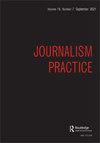Patterns of Journalistic Role Performance during Public Health Crises: Covering COVID-19 in the UK
IF 2
2区 文学
Q2 COMMUNICATION
引用次数: 0
Abstract
While journalism scholarship has long been exploring how journalistic role performance (“JRP” thereafter) varies in different scenarios, seldom have studies captured how JRP during public health crises reflects the all-around influence of such crises on journalism practice. To fill the gap, our study examined the patterns of JRP in UK news coverage of the COVID-19 pandemic. We draw on a content analysis of 4,184 news stories from 15 UK national news outlets across television, radio, print, and online platforms in 2020. Our results indicate that UK journalism emphasised the performance of the service role by providing news of use to the public, the civic role by (partially) inviting the public into political life, and the interventionist role by explicitly bringing to the fore journalists’ voices. UK journalism also suppressed the infotainment role. The power relations between UK journalists and the government showed a more complicated picture. UK journalists performed a watchdog role by maintaining a seemingly sceptical and distant approach to government sources, yet also showed traces of cooperation with government agendas in ensuring compliance with public health messaging. These findings are discussed in relation to ongoing debates in health and crisis news, and journalistic role performance.公共卫生危机期间新闻角色表现的模式:在英国报道COVID-19
虽然新闻学长期以来一直在探索新闻角色表现(JRP)在不同情景下的变化,但很少有研究捕捉到公共卫生危机期间的JRP如何反映此类危机对新闻实践的全面影响。为了填补这一空白,我们的研究检查了JRP在英国COVID-19大流行新闻报道中的模式。我们对2020年英国15家全国性新闻媒体的4184篇新闻报道进行了内容分析,这些新闻媒体包括电视、广播、印刷和在线平台。我们的研究结果表明,英国新闻业通过向公众提供有用的新闻来强调服务角色的表现,通过(部分地)邀请公众参与政治生活来强调公民角色的表现,通过明确地将记者的声音带到前台来强调干预角色的表现。英国新闻业也压制了信息娱乐的角色。英国记者与政府之间的权力关系显示出一幅更为复杂的图景。英国记者通过对政府消息来源保持看似怀疑和疏远的态度,发挥了监督作用,但也显示出在确保遵守公共卫生信息方面与政府议程合作的痕迹。这些发现与正在进行的关于健康和危机新闻的辩论以及新闻角色表现的讨论有关。
本文章由计算机程序翻译,如有差异,请以英文原文为准。
求助全文
约1分钟内获得全文
求助全文
来源期刊

Journalism Practice
COMMUNICATION-
CiteScore
5.50
自引率
14.30%
发文量
111
期刊介绍:
ournalism Practice provides opportunities for reflective, critical and research-based studies focused on the professional practice of journalism. The emphasis on journalism practice does not imply any false or intellectually disabling disconnect between theory and practice, but simply an assertion that Journalism Practice’s primary concern is to analyse and explore issues of practice and professional relevance. Journalism Practice is an intellectually rigorous journal with all contributions being refereed anonymously by acknowledged international experts in the field. An intellectually lively, but professionally experienced, Editorial Board with a wide-ranging experience of journalism practice advises and supports the Editor. Journalism Practice is devoted to: the study and analysis of significant issues arising from journalism as a field of professional practice; relevant developments in journalism training and education, as well as the construction of a reflective curriculum for journalism; analysis of journalism practice across the distinctive but converging media platforms of magazines, newspapers, online, radio and television; and the provision of a public space for practice-led, scholarly contributions from journalists as well as academics. Journalism Practice’s ambitious scope includes: the history of journalism practice; the professional practice of journalism; journalism training and education; journalism practice and new technology; journalism practice and ethics; and journalism practice and policy.
 求助内容:
求助内容: 应助结果提醒方式:
应助结果提醒方式:


